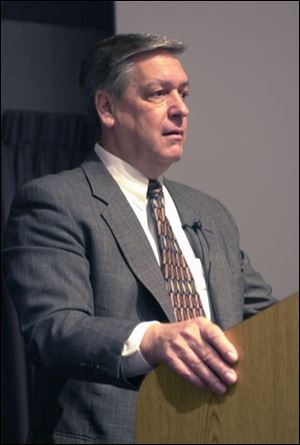
Trust instincts about violence
5/11/2001
Robert Martin, a 28-year veteran of the Los Angeles police department, now is vice president of a consulting firm that assists clients in predicting and avoiding violence.
The first question from a Toledo audience yesterday was one Robert Martin is asked frequently: “If a person is verbally violent, will they become physically violent?”
The nationally recognized safety and anti-violence expert answered quickly. “That's easy. I don't know,” he said.
But what Mr. Martin did tell the more than 100 teachers, caseworkers, counselors, social workers, lawyers, and police officers at yesterday's workshop was to trust their instincts in deciding if situations or people are dangerous and to remember the world is basically a safe place.
No simple formulas can accurately predict when situations become violent, he said.
Mr. Martin also spoke at a forum last night as part of the Junior League of Toledo's violence awareness and prevention series in the Toledo Hilton.
“Violence is certainly a central fact of American life, fear of violence more than anything else,” Mr. Martin said. “We understand the causes and nature of violence of every creature on Earth except ourselves.”
Mr. Martin was a member of the Los Angeles Police Department for 28 years. He is vice president of Gavin de Becker, Inc., a Studio City, Calif., consulting firm that helps clients predict and avoid violence.
He asserted that violence is part of human nature.
“The lesson that took me longest to learn is that it's not about us and them, the good guys and the bad guys. It's about us, people as a species,” he said.
The tendency may be to describe criminals, especially those who commit crimes against children, as “inhuman,” Mr. Martin said. But parents and children's advocates need to realize the potential perpetrators could be the “nice people living next door” or other trusted adults.
“Those people that we are willing to suspect are far less dangerous than those people we refuse to suspect,” he said.
That's where trusting intuition comes in, with a caveat from Mr. Martin: “No one is dangerous to everyone all the time,” he said.
Peggy Evans, safety officer at Toledo's Zepf Community Mental Health Center, said she'll use the advice in her work with people with mental illness and in rearing her two children, ages 6 and 10.
“One of the things I'm taking away from this is you can't rely on statistics alone. Sometimes you have to go with your intuition and your gut feeling,” she said. “I would like my own children to rely on their instincts.”
Mr. Martin's appearance is the first in a three-year series of events aimed at violence awareness and prevention sponsored by the Junior League and the Family and Child Abuse Prevention Center, said Kris Buffington, associate director of the center.
“We need to protect children from the harm inflicted upon them by child abuse, by witnessing domestic violence, by the other things that happen to children,” she said. “What we're doing today is part of that strategy.”